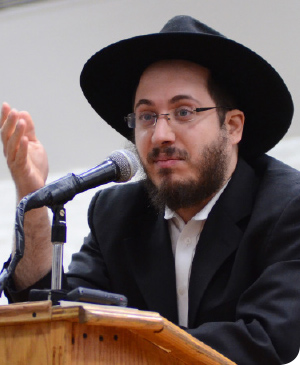 Dear Readers sh’yichyu,
Dear Readers sh’yichyu,
This Shabbos – Shabbos Metzora – is “Shabbos HaGadol – the Big Shabbos.” While the apparent reason for this name comes from the fact that this is the Shabbos before Pesach – and to commemorate the tremendous miracles that occurred before the Jewish people left Egypt – as Chassidim it takes on a whole new meaning: It is the Shabbos before 11 Nissan, the birthday of the Rebbe MH”M.
In the year of 5748 – which was a year of Hakhel, and 11 Nissan was just a few short weeks after the passing of the Rebbetzin – the Rebbe asked (Toras Menachem 5748 Vol. 3 page 38) that the day of his birthday [and the day of Erev Pesach, the birthday of the Rambam] should be used to make Hakhel gatherings. The gatherings should be for men, women and children (“with a mechitza according to Shulchan Aruch”).
[It is also important to mention that this year – 5776 – is the 150th (“Shnas HaKaN”) yahrtzait of the Tzemach Tzedek on 13 Nissan. By learning the sichos that were said and letters that the Rebbe wrote in 5723 (which was the 150th yahrtzait of the Alter Rebbe on 24 Teves) and seeing the “shturem” that the Rebbe made of this special number, we can learn that the Rebbe wants us to make a big shturem this year too in honor of the Rebbe the Tzemach Tzedek.]
In a letter dated 11 Nissan 5727 (which also was a year of Hakhel) the Rebbe connected the theme of Hakhel to the Yom tov of Pesach. The Mitzva of Hakhel is to bring together every Jewish person and that they should be inspired in Yiras Shamayim and the fulfillment of the Mitzvos.
This idea of bringing Jewish people together we find by Pesach as well. On Pesach we celebrate the exodus from Mitzrayim. As opposed to the other times that the Jews were redeemed from the various exiles, by Yetzias Mitzrayim, all of the Jewish people – every man, woman and child – left Mitzrayim. In the words of Moshe Rabbeinu (Shmos 10:9): “With our youth and with our elders we will go, with our sons and with our daughters, with our flocks and with our cattle we will go, for it is a festival of the Lord to us.”
This is expressed in Halacha as well: While in general, women are exempt from “Mitzvos Asai Shehazman G’rama – time bound positive commandments,” they are fully responsible for the Mitzvos of the night of the Seder. Chazal write that just like women are obligated to avoid Chametz on Pesach, so too they’re obligated in the mitzvah of eating matza (as the pasuk juxtaposes eating matza and avoiding chametz). Similarly, they are obligated in all the mitzvos of the night such as the 4 cups of wine, Matza, Maror, and saying the Hagada. (Shulchan Aruch HaRav, Orach Chaim 472:25).
Children as well, play a major role in the celebration of Pesach. The whole seder is based on “Vehigadeta Levincha – teaching your son the Mitzva of yetzias Mitzrayim.” We speak to every type of son – Chacham, Rasha, Tam and sh’eino yodea lishol and we invite the “fifth son” to the Seder – according to their understanding. We do this all before we actually fulfil our own Mitzvos of the night, the eating of “Pesach Matza and Maror.”
Learning about and celebrating Pesach, brings out in us the yearning and desire for the full redemption with the Hisgalus of Moshiach Tzidkeinu. On Shabbos Tazria-Metzora 5751, the Rebbe revealed to us the “direct path” to bring Moshiach:
“My intention here is action – and certainly the following will be publicized everywhere: In order to realize the immediate revelation and coming of Moshiach – each and every Jew (the men, whether they are dwellers in the tent (Yisachar) or men of business (Z’vulun), and the women and children, each one according to his ability) should increase their learning of Torah, particularly the subjects of Moshiach and Redemption.
“It would be even better if they would learn (in public) with ten others because, in addition to the advantage that ‘ten who sit and occupy themselves with Torah, the Divine Presence dwells among them,’ there is a particular advantage when learning about Moshiach and the Redemption in public. Such public learning affects the excitement and the heart-felt joy through which comes an increasing desire and anticipation for the coming of Moshiach.”
THIS YEAR IN YERUSHALAYIM, AMEN!
Rabbi Avtzon is the Rosh Yeshiva of Yeshivas Lubavitch Cincinnati and a well sought after speaker and lecturer. Recordings of his in-depth shiurim on Inyanei Geula u’Moshiach can be accessed at http://www.ylcrecording.com.